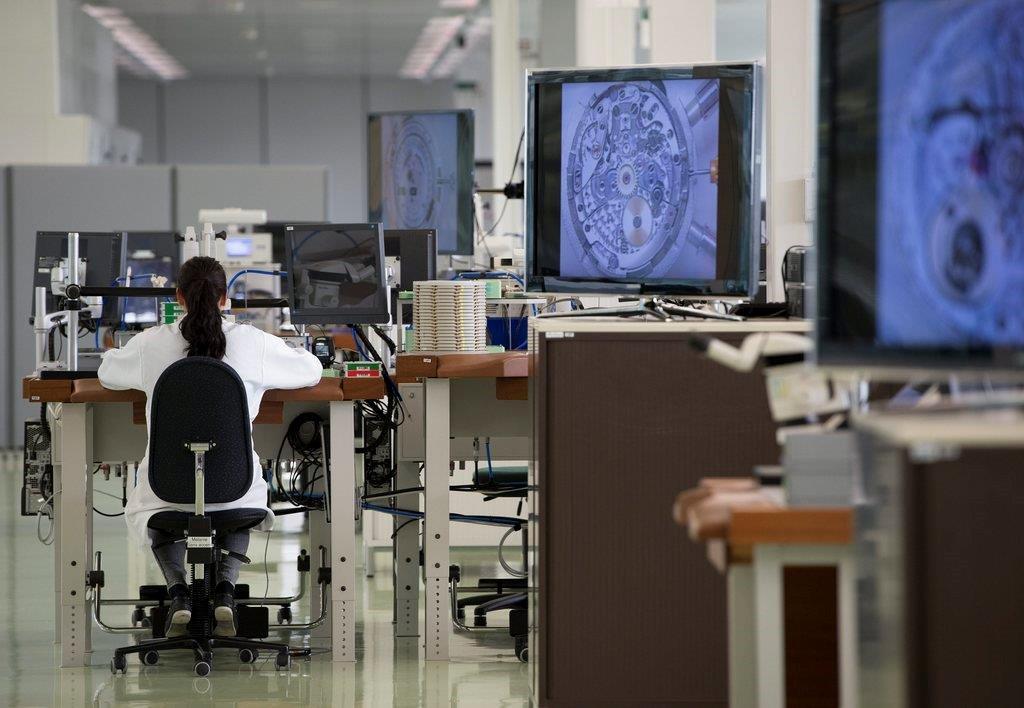
What makes modern luxury watchmaking tick?

Swiss watches are synonymous with luxury, not - as is increasingly the case today - robots and production lines. An anthropologist has delved into a profession at a crossroads.
Hervé Munz interviewed more than 150 watchmakers across the industry’s heartland in the Jura region of western Switzerland for his book, “La transmission en jeu. Apprendre, pratiquer et patrimonialiser l’horlogerie” (Transmission at stake: Learning, practising and passing down heritage watchmaking).
He looks into an industry that has undergone extensive industrialization in the last 20 years, a phenomenon that he says has devalued the traditional watchmaking profession.
swissinfo.ch: Swiss watchmaking has seen increased automation in production over the past two to three decades. But few brands are keen to talk about the factory floor being populated with robots and machines. Why is this such a taboo?
Hervé Munz: Over the last 30 years, Swiss watch companies have successfully repositioned themselves in the mechanical luxury watch market as exemplifying craftsmanship, heritage and tradition. The explosion in demand, particularly in Asia, has prompted many high-end brands to start manufacturing more niche ‘affordable luxury’ watches. This approach inevitably led to the industrialisation of production processes.
For example, back in 1992, a famous high-end brand in Vallée de Joux produced around 3,000 watches a year, compared with a production of over 40,000 watches today. Brands don’t really like to talk about this phenomenon because it is at odds with their messaging of luxury craftsmanship and rarity.
swissinfo.ch: But are customers really fooled?
H.M .: No. More and more people, including in China, no longer feel they are getting the respect they deserve as customers of so-called exclusive products. It’s particularly an issue in after-sales service: many brands have invested heavily in production equipment, all the while failing to adapt their maintenance and repair services accordingly.
swissinfo.ch: What impact does this massive industrialisation have on watchmaking?
H.M .: Thanks to the growth in luxury mechanical watches, the watchmaking profession has clearly become more popular in recent years, especially among young people. Big brands and educational institutions have sold them an image of a valuable craft. But it’s a very different reality for many young watchmakers working in the industry today. They feel a little cheated.

swissinfo.ch: In what way?
H.M .: Some watchmakers feel their skills are becoming less useful. They feel their know-how is being ignored and that they have a lesser role to play in the manufacture of timepieces. Also, the use of materials, such as silicon, means professionals cannot handle the components later on but can only replace them if they break down.
Independent watchmakers – both makers and repairers – worry they will no longer have easy access to supplies and spare parts because of the verticalisation policies introduced by the big groups and their companies. They also feel that their very existence is under threat.
During my investigation, I met many watchmakers who were dissatisfied and discouraged. It is not uncommon for young watchmakers to leave the profession just a few years after graduating.
swissinfo.ch: You even refer to an identity crisis within watchmaking. But the general public still holds this profession in some esteem.
H.M.: Yes, because watchmakers have enormous media visibility. Luxury is synonymous with antiquity, timelessness and customisation. The image of the watchmaker represents value and helps to establish brand authenticity in shops.
But this image is at odds with the evolution of the industry. Twenty-five years ago, only a small number of artisans were able to make watches fitted with tourbillons [a balancing mechanism]. Over the past 15 years, the market has been flooded with this type of product.
New manufacturing techniques have enabled brands to automate production of the most complex watches, while still describing them as unique in their marketing.
swissinfo.ch: But according to statistics from the umbrella group of watch industry employers, the number of unskilled workers is dropping compared with skilled workers. Is there really cause for alarm?
H.M .: It’s true that, officially, the qualification level has gone up, but these statistics don’t tell the whole story. We have to look at the situation more closely if we want to understand why watchmakers are worried about the future of their craft. When the Swiss watch industry made its comeback in the early 1990s, companies faced a shortage of manpower. Shorter training programmes were set up, aimed at adults, especially the unemployed. Since 2009, these shorter – but still qualifying – programmes have become increasingly predominant, including as part of the initial training.
swissinfo.ch: What will be the impact on jobs in the industry?
H.M .: We are gradually witnessing a redistribution of skills in the high-end industry. On the one hand, companies use highly qualified engineers to set up complex processes, and on the other hand, they call on operators with little to no skills to execute them.
For watchmakers with a CFC diploma, this new workforce is seen to be devaluing the profession [see infobox]. Many professionals are of the opinion that the influx of workers who have had shorter training negatively impacts on watchmakers’ salaries.
swissinfo.ch: Does that mean that watchmaking as a profession is now under threat?
H.M .: No. Despite the introduction of automation, the number of jobs in the watch industry has not declined over the last 20 years – quite the opposite. This is mainly due to the fact that over the past two decades the Swiss watch industry has become a high value-added industry, with unprecedented success.
But the issue goes beyond the number of jobs. If we want to continue to promote Swiss watchmaking excellence and its very specific skills, it will require greater investment in training, from both the private and public sector. You cannot have old-fashioned know-how with less training. Over time, this could pose a problem for the availability of skills-sets needed in after-sales service.
In Switzerland, watchmaking can be learned through apprenticeships in a company or at school. The four-year training programme leads to a federal certificate of capability (CPC). As well as assembling, a watchmaker must be able to manufacture, maintain and repair any part of the watch movement.
Adapted from French by Jessica Dacey

In compliance with the JTI standards
More: SWI swissinfo.ch certified by the Journalism Trust Initiative





























You can find an overview of ongoing debates with our journalists here . Please join us!
If you want to start a conversation about a topic raised in this article or want to report factual errors, email us at english@swissinfo.ch.